
Illustration by Ryan Inzana

Audio By Carbonatix
When Vangelina Gloria received a call that her daughter had been arrested in February 2019, she was not surprised. At age 19, her daughter Valentina Gloria was no stranger to the courts – she’d been diagnosed with autism and serious mental illness while she was still a minor, and her past arrests had all stemmed from someone calling the police during previous mental health crises.
She learned that her daughter was being held by the Maricopa County Sheriff’s Office on charges of assault during one of these incidents. She was worried, but assumed good intent.
But then, an attorney at the Office of the Public Defender gave her a video from December 2018 that shows Maricopa County officers handcuffing a visibly upset Valentina to a table during a mental health episode. Halfway through the video, she spits on one of the officers.
Valentina has spent five months in jail for this act. It’s still unclear from interviews if she fully understands what’s happening to her, or why. Due to her ongoing mental incapacity, a hearing on July 23 ruled that Valentina will have to wait at least another two months, without bail, before a court will hear her case.
In the meantime, Valentina remains in the Maricopa County jail system, forced to reap the consequences of a criminal justice system that was not made for her – at the expense of her physical and mental health.
Trapped in the System

Vangelina Gloria with pictures of her 19-year-old daughter, Valentina, who accrued charges after she spit during a mental health episode.
Hannah Critchfield
Valentina’s stay in jail began in February, when she was arrested for allegedly assaulting a medical health professional while experiencing an episode at an in-patient facility she’d checked into that morning. From there, she was booked into Maricopa County jail for a probation violation.
Charges were not pressed, but her mother soon learned she would not be released. The Maricopa County Attorney’s Office was demanding she be held on felony charges related to a spitting incident that happened two months before. That incident began with an arrest on December 29, 2018; Valentina attacked two nurses during yet another mental health crisis at St. Luke’s Hospital in Phoenix, where she was receiving in-patient care.
The hospital called authorities, and deputies took her to Lower Buckeye Jail, where her arms and legs were restrained with handcuffs and leather cuffs, her body stretched out like the letter X on a bed to limit her range of movement.
Two days later, Valentina was still in jail. It was New Year’s Eve 2018. What happened next can be seen in a video given to Vangelina by Eliana Ray Eitches, attorney at the Office of the Public Defender representing the defendant (Vangelina was subsequently assigned a new attorney when she was transferred to another court).
The video shows a calm, still-restrained Valentina being released to use the bathroom. After she does so, she returns to the bed for uniformed officers to chain her back down. But when it comes time to lift her hands up for officers to handcuff her, she pauses. “It’s cold,” she says.
Within four seconds, the officers force her arms back, and Valentina immediately begins to panic.
She sobs and shakes during the entire process. The correctional employees speak calmly, calling her only by her last name. As an officer adjusts a restraint on her right foot, she spits. It hits his cheek.
The officers yell at her, and place a spit mask over her head. A staff member of Correctional Health Services, which contracts with the jail to provide mental health services, is then seen entering for the first time.
This is the crime for which Valentina remains incarcerated. The charges of assault against the nurses at St. Luke’s were dropped a month later. The prosecutor’s office cited Valentina’s mental state as the justification for dismissing the felonies. But the office is still prosecuting her on two counts of “assault by a prisoner with bodily fluids” and two counts of aggravated assault, which also appear related to spitting.
“I guess people think once you’re an inmate, you’re an inmate, and you deserve to be there, to be punished,” said Vangelina. “But when she’s going through a crisis, she’s not controlling what’s going on, either. You have to give her time to de-escalate, be compassionate. They say the people with the mental illness don’t have empathy, but I think it’s the other way around at this point.”
Several attorneys and disability-rights organizations declined to comment on the legality of Valentina’s treatment based solely on the information the video provides. But the American Civil Liberties Union of Arizona did speak out on her behalf.
“The video is appalling to watch,” said Analise Ortiz, campaign strategist at ACLU of Arizona. “This incident exposes systemic problems within Arizona jails and prisons in which people are dehumanized, abused, and treated unjustly. All incarcerated people deserve access to medical and mental health attention, and we hope this incident is properly investigated.”
Nearly 2 million people with mental illness are booked into jails each year, according to the National Alliance on Mental Illness. The Virginia-based organization has found that they tend to stay longer than their non-mentally ill counterparts, and often, their mental health conditions get worse while they’re incarcerated.
About 23 percent of the people housed in Maricopa County jails have severe mental illness or need chronic mental health care, according to Maricopa County spokesperson Fields Moseley. Each inmate held by MCSO costs the county $105.15 per day – and the cost is even greater when mental health care is applied.
“Why didn’t this system identify her as being in crisis, and provide additional supports?” said Cynthia Macluskie, vice president of the Autism Society of Greater Phoenix and director of BE SAFE, a local organization that provides training to law officers on how to safely interact with people with developmental disabilities. “Also, why did a provider call the police to begin with? If they’re on the behavioral health unit, they’re the ones that are supposed to have the tools to handle it, so they shouldn’t be calling the police. This whole situation is a waste of taxpayer dollars – and I could talk about this all day long, because I have tons of cases of families that this has happened to.”
Who Is Valentina?
Valentina is one of six children, Phoenix-born and raised. Her many medical diagnoses include autism spectrum disorder, bipolar disorder, paranoia, depression, schizoaffective disorder, and post-traumatic stress disorder, according to court documents and medical records.
She is a survivor of sexual abuse, according to her mother. One of these assaults reportedly occurred while she was still a minor.
When Valentina was 14 and a freshman at South Mountain High School, she began running away from home every few weeks.
Child Safety officials eventually removed her from the custody of her separated parents and placed her in a series of group homes, according to her mother. Valentina was eventually able to return to live with her mother after a three-year battle with the state. In addition to winning custody, Vangelina secured holistic mental health services for her daughter upon her release.
Vangelina said that for about a year, things were finally good. “But then she turned 18, and the services changed,” she said. “It’s hard for her to adjust to big changes like that, in providers and routine.”
Court records confirm that all of Valentina’s past interactions with the criminal justice system happened while she was experiencing mental health crises. Last year, she was charged with disruption of an educational institution, a felony. According to the Phoenix police report, she called South Mountain High School, which was near a facility where she’d been receiving treatment, to say she was outside the school cutting herself with a knife. She was making “suicidal statements” as police apprehended her.
The incident occurred in spring. Then September came, and Valentina celebrated her 19th birthday.
On December 29, as previously mentioned, she went to St. Luke’s Hospital for in-patient care, where she began experiencing a mental health episode. The situation escalated from there – she spit on a nurse, and punched another in the face, according to police reports. Valentina told police and her mother that the second nurse had taken her aside and jammed her head into the wall, and that she was acting in self-defense.
That’s when she was taken to jail, where she committed the spitting crime for which she remains incarcerated.
Getting Care to Get Free

Valentina Gloria, 19, remains in jail after spitting while receiving treatment in Lower Buckeye’s mental health unit.
Vangelina Gloria
Vangelina filed a complaint with MSCO on April 9 for its treatment of her daughter based on the video. The investigation into her complaint is still ongoing, according to MCSO Deputy Joaquin Enriquez.
In the meantime, Valentina waits in jail.
In May, a judge ruled that she was mentally incompetent to face charges and must remain in custody to receive treatment through the Restoration to Competency Program (RTC) before standing for judgment on the initial spitting charges. A hearing on July 23 reaffirmed this ruling.
The RTC program is supposed to get inmates who are unable to understand proceedings against them to a point where they can aid their attorneys in their defense. But a Superior Court representative said he’s seen RTC cases stretch on for years due to disputes between the county and the defendant’s experts.
Questions remain about the quality of this program within jails and prisons. From November 2017 to May 2018, the Arizona Supreme Court appointed a committee of judges, law enforcement, prosecutors, defense attorneys, and mental health professionals to evaluate mental health treatment within holding facilities.
“With a significant number of persons with mental illness in Arizona’s jails and prisons, the Arizona criminal justice system has become a default provider of mental health care services,” the committee’s May 2018 report said. “Jails and prisons are not designed to be mental-
health-care institutions. The courts should play a prominent role in remedying this situation by identifying opportunities, when appropriate, to divert people out of the justice system and into treatment.”
Valentina was ordered to receive her RTC treatment through Estrella Jail, where she was transferred on July 23. MCSO declined to comment on the nature of that treatment, citing the ongoing investigation of her mother’s complaint.
The next hearing to evaluate her mental state is scheduled for September 20. By that point, Valentina will have spent almost a year in detention.
Deficits in Care
Her mental health has worsened during her time in the Maricopa County jail system, according to her mother.
She alleges that doctors within Lower Buckeye Jail’s mental health unit mis-prescribed her daughter high doses of lithium, despite past medical recommendations that she not take the drug due to severe side effects on her mood.
She said her daughter has recent self-inflicted injuries from banging her head against the wall while incarcerated at Lower Buckeye Jail, some of which resulted in stitches. Her mother said officers within the jail have told her that her daughter has expressed suicidal thoughts.
She said Valentina’s attempts to advocate for herself have been met with resistance. Doctors within the facility believe her daughter doesn’t have autism, she said; according to a medical record reviewed by Phoenix New Times, Valentina was diagnosed with the developmental disorder in 2016. CHS could not comment on Valentina’s diagnosis, citing HIPAA laws.
Misinformation
The amount of advocacy anyone outside the facility can do for Valentina is limited. Her mother described a confusing and tiresome process of interacting with the Maricopa County criminal justice system while seeking information about Valentina’s case.
On July 22, she received an email from the Maricopa County Sheriff’s Office stating that the investigation of her complaint had been closed. However, the next day, a reporter from New Times received an email from MCSO stating that the investigation was still ongoing. MCSO repeatedly declined to give information on the nature of Valentina’s case, citing the pending complaint.
Vangelina said she’s struggled to ensure the Maricopa County jail has her daughter’s complete, up-to-date medical records. She believes officials lack records from Lifewell Behavioral Wellness, the first mental health care provider Valentina used when she transitioned into adult services. The public defender affirmed that these records would be helpful, Vangelina said, but the burden was on her to provide them to the court.
When she contacted her daughter’s current provider, Community Bridges Inc., representatives said they were still waiting to receive the records before sending them to MCSO, and advised Vangelina to ask for them directly from Lifewell. When she did, Lifewell told her to contact Community Bridges.
Since the court’s ruling on July 23, shortly after her transfer into Estrella Jail, Valentina suddenly became unavailable for visitations, and she failed to appear in the MCSO online jail system. Phone calls to MCSO, by both a New Times reporter and her mother, did not provide additional information regarding why. A visit by New Times to Lower Buckeye Jail confirmed that she’d disappeared from the system because she’d been transferred back to the mental health unit, and would only be able to receive visitors upon re-entry into Estrella. The Lower Buckeye Jail front-desk employee could not provide any information about how long she’d be held there, citing HIPAA laws.
“Issues involving mental health and criminal conduct where violence is also a factor regularly present challenges,” Maricopa County Attorney Bill Montgomery said in an emailed statement. “Nonetheless, we endeavor to identify therapeutic resolutions that take into account the needs of an offender and the public’s safety.”
Vangelina said she’s contacted the Governor’s Office, the Arizona Ombudsman Office, city council members, nonprofits, and even the FBI for help – many have replied that the matter is not in their jurisdiction.
Phoenix City Council member Carlos García eventually connected Vangelina to Puente Human Rights Movement, a grassroots migrant advocacy organization (García previously served as its executive director).
In light of her allegations, she and Puente delivered a letter to Montgomery’s office on July 23, calling for Valentina’s release. Puente also started an online petition on her behalf.
But Vangelina is most concerned with her daughter’s safety while she remains incarcerated in the MCSO jail system.
“I want her to receive the proper services that anybody should be able to have,” she said. “Properly trained staff that can improve her health, not traumatize her and make her worse, who can de-escalate the situation, and make her feel like a person.
“The fact that these guards let her bang her head, that she had to get eight stitches,” she added. “I know nobody’s watching her. And if anything bad happens to her, an apology is not going to do.”
“I’m Going to Die in Here”
A week after her July 23 hearing, Valentina and Vangelina Gloria sat with New Times in Lower Buckeye Jail, talking through a video monitor. She was again able to have visits. Officers did not offer an explanation for the change.

Valentina Gloria talks at Lower Buckeye jail on Monday, July 29. She cut her head after hitting it against a wall in the facility.
Hannah Critchfield
A fresh gash ran along the middle of Valentina’s forehead. She’d gotten three more write-ups for assault on correctional officers, who tried to stop her after she began banging her head against a wall on Friday.
“I only made it two days in Estrella, mama,” she said.
“That’s good, baby, you did really good, that’s the longest time you’ve been there,” her mother said reassuringly. “But please don’t do that anymore, baby … If something bad happens to you and I lose you, there’s only one of you.”
“I’m better off gone,” Valentina said, looking away from the monitor. “Then I can stop disappointing you.”
“No baby, you’re not better off gone,” Vangelina said firmly. “You’re awesome in the person that you are. You know how they’re gonna go back and review your charges? You just go back and explain to them that they cornered you, that you weren’t trying to hurt nobody, okay?”
“But they took away your visits,” her daughter said, talking hurriedly. “I keep getting in trouble, what if I don’t get to talk to you for three months -“
“I know, baby, but I got through today. I promise I’m not leaving you in here, I never will. You just gotta keep working with me, okay?”
“I’m gonna die in here.”

Vangelina and her daughter Valentina Gloria talk on Monday, July 29. She asks her to smile before their 15-minute video visitation ends.
Hannah Critchfield
Looking Forward
Two days after the letter calling for Valentina’s release was delivered to his office, Maricopa County Attorney Bill Montgomery announced he’d signed a contract with Southwest Behavioral Health and Services to provide treatment for certain felony offenders diagnosed as seriously mentally ill.
If determined eligible after assessing their risk to reoffend, adult offenders will enter a diversion program through the provider – and prosecution will be suspended.
“By joining with Southwest Behavioral Health as a provider, we can better help those offenders whose criminal actions were likely influenced by mental illness,” Montgomery said in the press release.
If they successfully complete the curriculum, MCAO will file a motion to dismiss their case with prejudice.
The new program began on August 12. It’s still unclear whether Valentina will qualify.